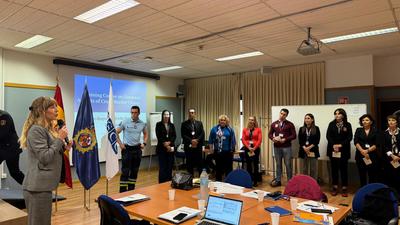-
Our work
-
Fields of work
- Arms control
- Border management
- Combating trafficking in human beings
- Conflict prevention and resolution
- Countering terrorism
- Cyber/ICT Security
- Democratization
- Economic activities
- Education
- Elections
- Environmental activities
- Gender equality
- Good governance
- Human rights
- Media freedom and development
- Migration
- National minority issues
- Policing
- Reform and co-operation in the security sector
- Roma and Sinti
- Rule of law
- Tolerance and non-discrimination
- Youth
- Field operations
- Projects
-
Meetings and conferences
- Summit meetings
- Review Conferences
- Ministerial Council meetings
- Plenary meetings of the Permanent Council
- Plenary Meetings of the Forum for Security Co-operation
- Security Review Conferences
- Annual Implementation Assessment Meetings
- Economic and Environmental Forum
- Economic and Environmental Dimension Implementation Meetings
- Human rights meetings
- Media conferences
- Cyber/ICT security conferences
- Conference of the Alliance against Trafficking in Persons
- Gender equality conferences
- Annual OSCE Mediterranean conferences
- Annual OSCE Asian conferences
- Partnerships
-
Fields of work
-
Countries
- All
-
Participating States
- Albania
- Andorra
- Armenia
- Austria
- Azerbaijan
- Belgium
- Belarus
- Bosnia and Herzegovina
- Bulgaria
- Canada
- Croatia
- Cyprus
- Czechia
- Denmark
- Estonia
- Finland
- France
- Georgia
- Germany
- Greece
- Holy See
- Hungary
- Iceland
- Ireland
- Italy
- Kazakhstan
- Kyrgyzstan
- Latvia
- Liechtenstein
- Lithuania
- Luxembourg
- Malta
- Moldova
- Monaco
- Mongolia
- Montenegro
- The Netherlands
- North Macedonia
- Norway
- Poland
- Portugal
- Romania
- Russian Federation
- San Marino
- Serbia
- Slovakia
- Slovenia
- Spain
- Sweden
- Switzerland – OSCE Chairpersonship 2026
- Tajikistan
- Türkiye
- Turkmenistan
- Ukraine
- United Kingdom
- United States of America
- Uzbekistan
- Asian Partners for Co-operation
- Mediterranean Partners for Co-operation
-
Structures and institutions
- Chairpersonship
-
Secretariat
- Secretary General
- Office of the Secretary General
- Conflict Prevention Centre
- Transnational Threats Department
- Office of the Special Representative and Co-ordinator for Combating Trafficking in Human Beings
- Office of the Co-ordinator of OSCE Economic and Environmental Activities
- Gender Issues Programme
- Opportunities for Youth
- Department of Human Resources
- Department of Management and Finance
- Office of Internal Oversight
- Documentation Centre in Prague
- Institutions
-
Field operations
- Presence in Albania
- Centre in Ashgabat
- Programme Office in Astana
- Programme Office in Bishkek
- Mission to Bosnia and Herzegovina
- Programme Office in Dushanbe
- Mission in Kosovo
- Mission to Moldova
- Mission to Montenegro
- Mission to Serbia
- Mission to Skopje
- Project Co-ordinator in Uzbekistan
- Closed field activities
- Parliamentary Assembly
- Court of Conciliation and Arbitration
- Organizational structure
- About us
News Item
OSCE and the Spanish National Police train Mediterranean border security officers on gendered aspects of cross-border crimes
On 30 and 31 October, the OSCE Transnational Threats Department's Border Security and Management Unit in close co-operation with the Spanish National Police hosted an interactive training course on gendered aspects of transnational threats in Madrid. The event brought together 27 first- and second-line border security officers from Albania, France, Greece, Italy, Malta, Montenegro, Spain and Tunisia.

- Issued on:
- Issued by:
- OSCE Secretariat, Transnational Threats Department
- Fields of work:
- Border management
On 30 and 31 October, the OSCE Transnational Threats Department's Border Security and Management Unit in close co-operation with the Spanish National Police hosted an interactive training course on gendered aspects of transnational threats in Madrid. The event brought together 27 first- and second-line border security officers from Albania, France, Greece, Italy, Malta, Montenegro, Spain and Tunisia.
Experts from the European Union Advisory Mission to Ukraine, the Office of the OSCE Special Representative and Co-ordinator for Combating Trafficking in Human Beings, the Spanish National Police and members of the OSCE-led Mobile Training Team conducted the course sessions.
“I would like to stress also that National Police has made a constant effort to introduce a gender perspective in its daily work, among other things, by including more and more professional women in identification of crimes”, said Chief Superintendent Eulalia González Peña, Deputy Director of the Technical Cabinet, Spanish National Police, in her opening remarks.
Ambassador Alena Kupchyna, OSCE Co-ordinator of Activities to Address Transnational Threats, emphasized that “Cross-border crimes impact men, women, boys, and girls differently and have challenged border and law enforcement agencies across the OSCE area and beyond in responding to different gender-specific needs and experiences of those affected”.
The course addressed the nexus between organized transnational crimes and gender and examined the impact of gender-based biases and stereotypes on the effectiveness of border services. Participants engaged in discussions on the role of women and men in terrorism and violent extremism, including the push and pull factors for both genders to participate in these crimes.
The training course also introduced gender-sensitive and trauma-informative interviewing techniques to improve the identification of victims and potential perpetrators of cross-border crimes. The session on communication at the borders introduced the possible indicators and signs of deception in non-verbal communication with perpetrators of cross-border crimes.
During the interactive session, participants analysed the gendered dynamics of human trafficking and how men and boys can be silent victims. They also engaged in exercises addressing harmful biases and stereotypes.
This training course was conducted under the OSCE initiative aimed at strengthening border security in the Mediterranean region.